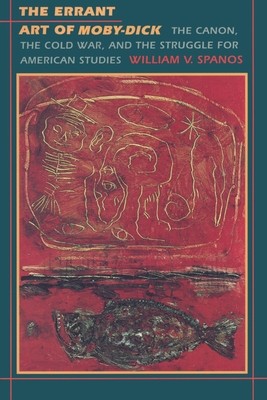
- We will send in 10–14 business days.
- Author: William V Spanos
- Publisher: Duke University Press
- ISBN-10: 0822315998
- ISBN-13: 9780822315995
- Format: 16.4 x 22.8 x 2.8 cm, minkšti viršeliai
- Language: English
- SAVE -10% with code: EXTRA
Reviews
Description
In The Errant Art of Moby-Dick, one of America's most distinguished critics reexamines Melville's monumental novel and turns the occasion into a meditation on the history and implications of canon formation. In Moby-Dick-a work virtually ignored and discredited at the time of its publication-William V. Spanos uncovers a text remarkably suited as a foundation for a "New Americanist" critique of the ideology based on Puritan origins that was codified in the canon established by "Old Americanist" critics from F. O. Matthiessen to Lionel Trilling. But Spanos also shows, with the novel still as his focus, the limitations of this "New Americanist" discourse and its failure to escape the totalizing imperial perspective it finds in its predecessor.
Combining Heideggerian ontology with a sociopolitical perspective derived primarily from Foucault, the reading of Moby-Dick that forms the center of this book demonstrates that the traditional identification of Melville's novel as a "romance" renders it complicitous in the discourse of the Cold War. At the same time, Spanos shows how New Americanist criticism overlooks the degree to which Moby-Dick anticipates not only America's self-representation as the savior of the world against communism, but also the emergent postmodern and anti-imperial discourse deployed against such an image. Spanos's critique reveals the extraordinary relevance of Melville's novel as a post-Cold War text, foreshadowing not only the self-destructive end of the historical formation of the American cultural identity in the genocidal assault on Vietnam, but also the reactionary labeling of the current era as "the end of history."
This provocative and challenging study presents not only a new view of the development of literary history in the United States, but a devastating critique of the genealogy of ideology in the American cultural establishment.
EXTRA 10 % discount with code: EXTRA
The promotion ends in 21d.16:38:32
The discount code is valid when purchasing from 10 €. Discounts do not stack.
- Author: William V Spanos
- Publisher: Duke University Press
- ISBN-10: 0822315998
- ISBN-13: 9780822315995
- Format: 16.4 x 22.8 x 2.8 cm, minkšti viršeliai
- Language: English English
In The Errant Art of Moby-Dick, one of America's most distinguished critics reexamines Melville's monumental novel and turns the occasion into a meditation on the history and implications of canon formation. In Moby-Dick-a work virtually ignored and discredited at the time of its publication-William V. Spanos uncovers a text remarkably suited as a foundation for a "New Americanist" critique of the ideology based on Puritan origins that was codified in the canon established by "Old Americanist" critics from F. O. Matthiessen to Lionel Trilling. But Spanos also shows, with the novel still as his focus, the limitations of this "New Americanist" discourse and its failure to escape the totalizing imperial perspective it finds in its predecessor.
Combining Heideggerian ontology with a sociopolitical perspective derived primarily from Foucault, the reading of Moby-Dick that forms the center of this book demonstrates that the traditional identification of Melville's novel as a "romance" renders it complicitous in the discourse of the Cold War. At the same time, Spanos shows how New Americanist criticism overlooks the degree to which Moby-Dick anticipates not only America's self-representation as the savior of the world against communism, but also the emergent postmodern and anti-imperial discourse deployed against such an image. Spanos's critique reveals the extraordinary relevance of Melville's novel as a post-Cold War text, foreshadowing not only the self-destructive end of the historical formation of the American cultural identity in the genocidal assault on Vietnam, but also the reactionary labeling of the current era as "the end of history."
This provocative and challenging study presents not only a new view of the development of literary history in the United States, but a devastating critique of the genealogy of ideology in the American cultural establishment.


Reviews